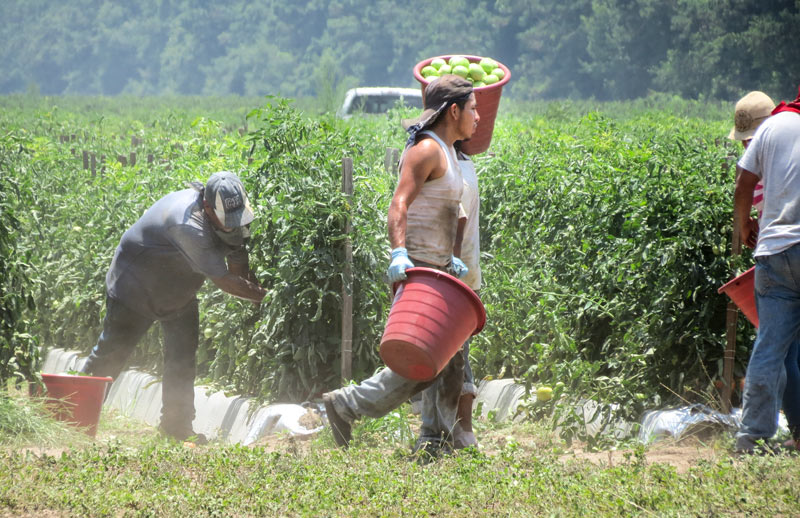
HELENA ISLAND—Hundreds of migrant workers who labor in the heat to pick crops in the Beaufort area recently received some welcome necessities thanks to the efforts of the Franciscan Center.
Sister Canice Adams of the Sisters of Sts. Cyril and Methodius, who run the center, said area churches came together to help the workers.
On June 20, the sisters and volunteers from the center delivered 300 boxes of food to people in nine different migrant camps on St. Helena Island. They also received supplies including toiletries, T-shirts, socks, towels and washcloths, and new toys for the children.

Sister Canice said the shoes — 1,000 pairs donated by members of St. Gregory the Great Church in Bluffton — were a big hit. Other parishes in the area, including Presbyterian and Methodist congregations, donated money to purchase other supplies.
Volunteers from the U.S. Navy joined in the effort, helping load the goods and transport them to the camps.
Kathryn “Winkie” Schlaudecker, a longtime volunteer at the center, said efforts to help migrant workers have been going on for almost 30 years. The Franciscan sisters who started the center in the late ’80s first discovered the needs of the people by driving down dirt roads and exploring the area.
Since then, work with the migrants has been one of the center’s main ministries. They rely on donations from the community and recently received a $5,000 grant from the Sisters of Charity Foundation.
Sister Canice said migrants this summer come from both Mexico and Haiti and are picking and packing tomatoes and watermelons. The workers arrive in the area in late February and March to plant the crops, then move north for other jobs. They return to South Carolina in late spring and early summer for the harvest.
In recent years, more and more people bring their entire families with them. Sister Canice said it isn’t uncommon to see a woman who is pregnant one year, and then get to meet her new son or daughter the following season.
Efforts to take supplies to the camps this year were hampered by bad weather that turned dirt roads into bog trails leading to the small cottages where these men and women stay. The volunteers brought the supplies in a caravan of trucks, cars and vans.
“The cottages are very small and often you might have as many as six people living in one little space,” Sister Canice said. “The people share a common kitchen and have common bathroom spaces as well.”
The brief weather delay didn’t dampen the workers’ happiness.
“Everyone we encountered was absolutely grateful for what they got,” Sister Canice said. “They were especially excited with the shoes, and the children loved the toys. The whole effort was positive.”
Top photo provided: Migrant workers pick tomatoes at a farm in the Beaufort area.


